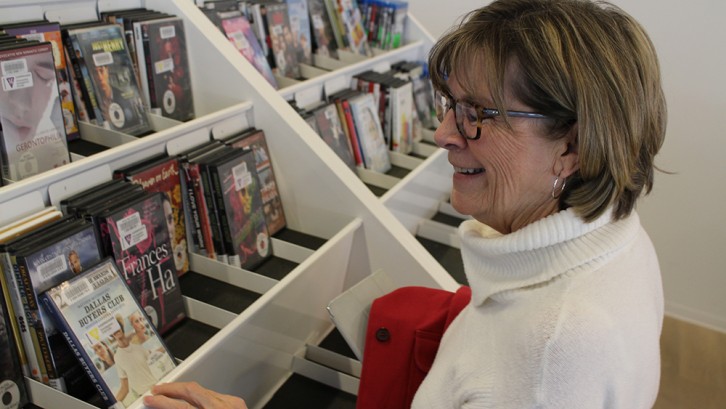Entertainment
Meet the Maritime film classifiers
The classifiers on the Maritime Film Classification Board watch every film before you and do it for 400 minutes a day

caption
Sherry Norton-Brunelle has been a classifier since January, 2014.
caption
Sherry Norton-Brunelle has been a classifier for two years. Classifiers are appointed to a limited term.You’re in line for a movie, there’s a lump in your throat. At the counter, your voice trembles a little. The ticket seller sees the panic in your eyes and shakes his head: No admittance – all because of what you think is some arbitrary age restriction.
“I’ve had messages on the (answering) machine from Friday night from an incensed 13-year old who wasn’t able to go here, nor there,” says Annette Sali, film classifier overseer with the Maritime Film Classification Board. “We have quite a bit of public feedback.”
They watch every film before you do and decide who gets to see it. That means everything that’s headed for theatres and to be sold in stores across the province. They watch and watch out for every dirty word, blood splatter and nipple.
While the regulations are broken down in meticulous detail, they’re all set with one goal in mind.
“It’d be to determine the psychological impact on the people watching it,” says Sali.
In addition to Sali, there are 14 classifiers in the province. They work on average a day a week.
Watch movies all day and get paid? Well, sure, once you get past the selection process.
“It’s not as great as I thought it’d be,” says Sali. A “day’s work” is roughly 400 minutes of film, which comes to about four movies. A full day pays $100, but it’s a lot of time spent staring at a screen all by yourself, and at times, it doesn’t feel like you’re watching a movie at all.
“Once you classify for a bit, you never ‘watch’ a movie again,” says Sali. “Once you start classifying, you see everything a little bit differently, because you have to count every time someone says a bad word. You don’t really watch them for enjoyment.”
Sherry Norton-Brunelle, another classifier, agrees it’s a hard habit to break.
“If I’m watching TV later that night, I’ll hear ‘hell’ and it clicks in my head that I should write that down,” she says.
Yet those long hours to yourself have a charm of their own.
“I’m an introvert, so if I’m working, it’s almost meditative, sitting in that dark theatre,” she says. “Just working along, quiet and all that. It’s excellent that way.”
The latest major change to the classification system was in 2005 with the introduction of “18A”, a stepping stone between “14A” and the restrictive “R”. But Norton-Brunelle wishes Hollywood would tone down the level of violence in many films.
“I worry about all the violence today and kids seeing that as an unreal thing,” she says. “I saw one zombie-film, and they were cutting people’s limbs off. It was supposed to be a comedy! Terrible. I thought, How can that be entertaining? I think we gave it an 18A.”
Sali says the purpose of the board is not to restrict.
“I think of this job as a public service. To give parents information. We provide that. We’ve watched it. This is what we’ve seen, this is what we’ve heard, and this is what we think,” Sali says.
And the inquiries from the public can get oddly specific.
“I’ve gotten a lot of calls from gentlemen who call and ask ‘Can you tell me how many times the F-word is said, because I’m taking my mother-in-law, and I’m not sure whether to take her’,” says Sali. “Or ‘Is there a lot of blasphemy?’ because I’m taking my aunt and she’s really religious.”
And for all the suffering 13-year-old moviegoers, please know that there is empathy to be found.
“I remember not being able to go to a film and thinking that’s the stupidest thing I’ve ever heard of,” says Sali. “It’s almost like a rite-of-passage, trying to get in. But if I had gotten in and gone home and told my mother, I probably would have gotten in trouble.”
About the author
Mikkel Frederiksen
Mikkel is finishing his Master of Journalism at the University of King's College. He's fond of watching films, and sometimes writes about them...
